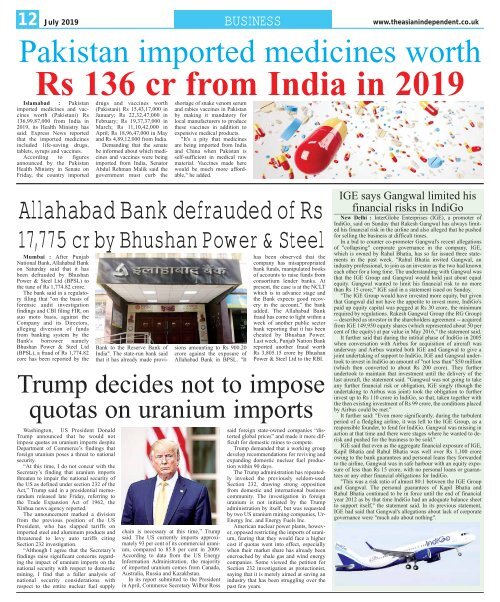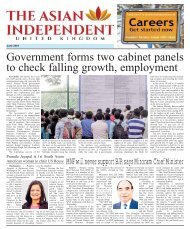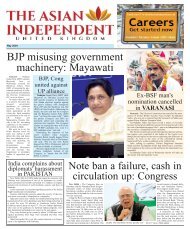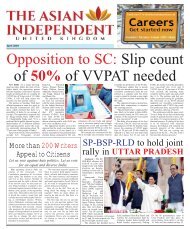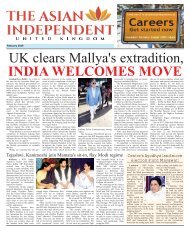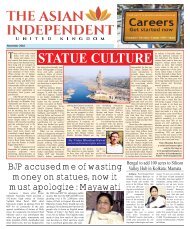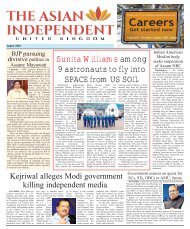July 2019
You also want an ePaper? Increase the reach of your titles
YUMPU automatically turns print PDFs into web optimized ePapers that Google loves.
12 <strong>July</strong> <strong>2019</strong><br />
BUSINESS<br />
www.theasianindependent.co.uk<br />
Pakistan imported medicines worth<br />
Rs 136 cr from India in <strong>2019</strong><br />
Islamabad : Pakistan<br />
imported medicines and vaccines<br />
worth (Pakistani) Rs<br />
136,99,87,000 from India in<br />
<strong>2019</strong>, its Health Ministry has<br />
said. Express News reported<br />
that the imported medicines<br />
included life-saving drugs,<br />
tablets, syrups and vaccines.<br />
According to figures<br />
announced by the Pakistan<br />
Health Ministry in Senate on<br />
Friday, the country imported<br />
drugs and vaccines worth<br />
(Pakistani) Rs 15,43,17,000 in<br />
January; Rs 22,32,47,000 in<br />
February; Rs 19,37,37,000 in<br />
March; Rs 11,10,42,000 in<br />
April; Rs 18,96,47,000 in May<br />
and Rs 4,89,12,000 from India.<br />
Demanding that the senate<br />
be informed about which medicines<br />
and vaccines were being<br />
imported from India, Senator<br />
Abdul Rehman Malik said the<br />
government must curb the<br />
shortage of snake venom serum<br />
and rabies vaccines in Pakistan<br />
by making it mandatory for<br />
local manufacturers to produce<br />
these vaccines in addition to<br />
expensive medical products.<br />
"It's a pity that medicines<br />
are being imported from India<br />
and China when Pakistan is<br />
self-sufficient in medical raw<br />
material. Vaccines made here<br />
would be much more affordable,"<br />
he added.<br />
Allahabad Bank defrauded of Rs<br />
17,775 cr by Bhushan Power & Steel<br />
Mumbai : After Punjab<br />
National Bank, Allahabad Bank<br />
on Saturday said that it has<br />
been defrauded by Bhushan<br />
Power & Steel Ltd (BPSL) to<br />
the tune of Rs 1,774.82 crore.<br />
The bank said in a regulatory<br />
filing that "on the basis of<br />
forensic audit investigation<br />
findings and CBI filing FIR, on<br />
suo moto basis, against the<br />
Company and its Directors,<br />
alleging diversion of funds<br />
from banking system by the<br />
has been observed that the<br />
company has misappropriated<br />
bank funds, manipulated books<br />
of accounts to raise funds from<br />
consortium lender banks. At<br />
present, the case is at the NCLT<br />
which is in advance stage and<br />
the Bank expects good recovery<br />
in the account," the bank<br />
added. The Allahabad Bank<br />
fraud has come to light within a<br />
week of another public sector<br />
bank reporting that it has been<br />
cheated by Bhushan Power.<br />
Bank's borrower namely<br />
Last week, Punjab Nation Bank<br />
Bhushan Power & Steel Ltd Bank to the Reserve Bank of sions amounting to Rs 900.20 reported another fraud worth<br />
(BPSL), a fraud of Rs 1,774.82 India". The state-run bank said crore against the exposure of Rs 3,805.15 crore by Bhushan<br />
core has been reported by the that it has already made provi-<br />
Allahabad Bank in BPSL. "It Power & Steel Ltd to the RBI.<br />
Trump decides not to impose<br />
quotas on uranium imports<br />
Washington, US President Donald<br />
Trump announced that he would not<br />
impose quotas on uranium imports despite<br />
Department of Commerce’s findings that<br />
foreign uranium poses a threat to national<br />
security.<br />
“At this time, I do not concur with the<br />
Secretary’s finding that uranium imports<br />
threaten to impair the national security of<br />
the US as defined under section 232 of the<br />
Act,” Trump said in a presidential memorandum<br />
released late Friday, referring to<br />
the Trade Expansion Act of 1962, the<br />
Xinhua news agency reported.<br />
The announcement marked a division<br />
from the previous position of the US<br />
President, who has slapped tariffs on<br />
imported steel and aluminum products and<br />
threatened to levy auto tariffs citing<br />
Section 232 investigation.<br />
“Although I agree that the Secretary’s<br />
findings raise significant concerns regarding<br />
the impact of uranium imports on the<br />
national security with respect to domestic<br />
mining, I find that a fuller analysis of<br />
national security considerations with<br />
respect to the entire nuclear fuel supply<br />
chain is necessary at this time,” Trump<br />
said. The US currently imports approximately<br />
93 per cent of its commercial uranium,<br />
compared to 85.8 per cent in 2009.<br />
According to data from the US Energy<br />
Information Administration, the majority<br />
of imported uranium comes from Canada,<br />
Australia, Russia and Kazakhstan.<br />
In its report submitted to the President<br />
in April, Commerce Secretary Wilbur Ross<br />
said foreign state-owned companies “distorted<br />
global prices” and made it more difficult<br />
for domestic mines to compete.<br />
Trump demanded that a working group<br />
develop recommendations for reviving and<br />
expanding domestic nuclear fuel production<br />
within 90 days.<br />
The Trump administration has repeatedly<br />
invoked the previously seldom-used<br />
Section 232, drawing strong opposition<br />
from domestic and international business<br />
community. The investigation in foreign<br />
uranium is not initiated by the Trump<br />
administration by itself, but was requested<br />
by two US uranium mining companies, Ur-<br />
Energy Inc. and Energy Fuels Inc.<br />
American nuclear power plants, however,<br />
opposed restricting the imports of uranium,<br />
fearing that they would face a higher<br />
cost if quotas went into effect, especially<br />
when their market share has already been<br />
encroached by shale gas and wind energy<br />
companies. Some viewed the petition for<br />
Section 232 investigation as protectionist,<br />
saying that it is merely aimed at saving an<br />
industry that has been struggling over the<br />
past few years.<br />
IGE says Gangwal limited his<br />
financial risks in IndiGo<br />
New Delhi : InterGlobe Enterprises (IGE), a promoter of<br />
IndiGo, said on Sunday that Rakesh Gangwal has always limited<br />
his financial risk in the airline and also alleged that he pushed<br />
for selling the business at difficult times.<br />
In a bid to counter co-promoter Gangwal's recent allegations<br />
of "collapsing" corporate governance in the company, IGE,<br />
which is owned by Rahul Bhatia, has so far issued three statements<br />
in the past week. "Rahul Bhatia invited Gangwal, an<br />
industry professional, to join as an investor as the two had known<br />
each other for a long time. The understanding with Gangwal was<br />
that the IGE Group and Gangwal would hold just about equal<br />
equity. Gangwal wanted to limit his financial risk to no more<br />
than Rs 15 crore," IGE said in a statement isued on Sunday.<br />
"The IGE Group would have invested more equity, but given<br />
that Gangwal did not have the appetite to invest more, IndiGo's<br />
paid up equity capital was pegged at Rs 30 crore, the minimum<br />
required by regulations. Rakesh Gangwal Group (the RG Group)<br />
-- described as investor in the shareholders agreement -- acquired<br />
from IGE 149,950 equity shares (which represented about 50 per<br />
cent of the equity) at par value in May 2016," the statement said.<br />
It further said that during the intitial phase of IndiGo in 2005<br />
when conversation with Airbus for acquisition of aircraft was<br />
underway and Airbus wanted both IGE and Gangwal to give a<br />
joint undertaking of support to IndiGo, IGE and Gangwal undertook<br />
to invest in IndiGo an amount of "not less than" $50 million<br />
(which then converted to about Rs 200 crore). They further<br />
undertook to maintain that investment until the delivery of the<br />
last aircraft, the statement said. "Gangwal was not going to take<br />
any further financial risk or obligation, IGE singly (though the<br />
undertaking to Airbus was joint) took the obligation to further<br />
invest up to Rs 110 crore in IndiGo, so that, taken together with<br />
the then existing investment of Rs 99 crore, the conditions placed<br />
by Airbus could be met."<br />
It further said: "Even more significantly, during the turbulent<br />
period of a fledgling airline, it was left to the IGE Group, as a<br />
responsible founder, to fend for IndiGo. Gangwal was missing in<br />
action at that time and there were stages where he wanted to derisk<br />
and pushed for the business to be sold."<br />
IGE said that even as the aggregate financial exposure of IGE,<br />
Kapil Bhatia and Rahul Bhatia was well over Rs 1,100 crore<br />
owing to the bank guarantees and personal loans they forwarded<br />
to the airline, Gangwal was in safe harbour with an equity exposure<br />
of less than Rs 15 crore, with no personal loans or guarantees<br />
or any other financial obligations for IndiGo.<br />
"This was a risk ratio of almost 80:1 between the IGE Group<br />
and Gangwal. The personal guarantees of Kapil Bhatia and<br />
Rahul Bhatia continued to be in force until the end of financial<br />
year 2012 as by that time IndiGo had an adequate balance sheet<br />
to support itself," the statement said. In its previous statement,<br />
IGE had said that Gangwal's allegations about lack of corporate<br />
governance were "much ado about nothing".


